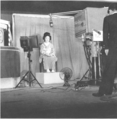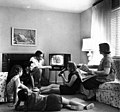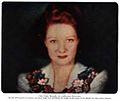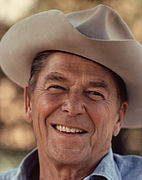The Television Portal

Television (TV) is a telecommunication medium for transmitting moving images and sound. Additionally, the term can refer to a physical television set rather than the medium of transmission. Television is a mass medium for advertising, entertainment, news, and sports. The medium is capable of more than "radio broadcasting," which refers to an audio signal sent to radio receivers.
Television became available in crude experimental forms in the 1920s, but only after several years of further development was the new technology marketed to consumers. After World War II, an improved form of black-and-white television broadcasting became popular in the United Kingdom and the United States, and television sets became commonplace in homes, businesses, and institutions. During the 1950s, television was the primary medium for influencing public opinion. In the mid-1960s, color broadcasting was introduced in the U.S. and most other developed countries.
In 2013, 79% of the world's households owned a television set. The replacement of earlier cathode-ray tube (CRT) screen displays with compact, energy-efficient, flat-panel alternative technologies such as LCDs (both fluorescent-backlit and LED), OLED displays, and plasma displays was a hardware revolution that began with computer monitors in the late 1990s. Most television sets sold in the 2000s were flat-panel, mainly LEDs. Major manufacturers announced the discontinuation of CRT, Digital Light Processing (DLP), plasma, and even fluorescent-backlit LCDs by the mid-2010s. LEDs are being gradually replaced by OLEDs. Also, major manufacturers have started increasingly producing smart TVs in the mid-2010s. Smart TVs with integrated Internet and Web 2.0 functions became the dominant form of television by the late 2010s. (Full article...)
Selected article -
Selected image -

A television studio is an installation in which television or video productions take place, either for live television, for recording live to tape, or for the acquisition of raw footage for postproduction. The design of a studio is similar to, and derived from, movie studios, with a few amendments for the special requirements of television production.
Did you know (auto-generated) -

- ... that television production companies working in Bhadun, Bangladesh, can hire a local woman as an extra for ৳500 (US$5.30) per day?
- ... that due to her leftist beliefs, journalist Ana Amado was told not to come to work by her public television employer while her husband was on the death list of the Argentine Anticommunist Alliance?
- ... that the 1999 video game Interplay Sports Baseball Edition 2000 used a public-address announcer while its rivals were switching to two commentators as featured on real MLB game broadcasts?
- ... that Fred Rogers created and hosted a television documentary series titled Old Friends ... New Friends due to his concern that older generations were getting more isolated from younger generations?
- ... that a scene from the television adaptation of the manga It's All About the Looks was filmed at the Tokyo Girls Collection fashion show?
- ... that the radio station at Western Washington University interfered with telephone and television services in a campus dormitory?
Selected quote -
More did you know
- ...that the book The Psychology of The Simpsons uses this TV series to analyze topics in psychology including clinical psychology, cognition and Pavlovian conditioning?
- ...that the 1994 Guinness television advertisement Anticipation used jump cutting techniques to make an actor appear to be performing a physically impossible dance?
- ...that Black Entertainment Television comedy series We Got to Do Better, had its name changed from Hot Ghetto Mess amidst allegations of enforcing negative stereotypes of African Americans?
- ...that the television drama Hill Street Blues imitated the visual style of The Police Tapes, a low-budget documentary about a police precinct in the South Bronx?
- ...that the Zambian district of Chiengi has no television or telephone service?
Selected biography -
Howard W. "Kroger" Babb (December 30, 1906 – January 28, 1980) was an American film producer and showman. His marketing techniques were similar to a travelling salesman's, with roots in the medicine show tradition. Self-described as "America's Fearless Young Showman", he is best known for his presentation of the 1945 exploitation film Mom and Dad, which was added to the National Film Registry of the Library of Congress in 2005.
Babb was involved in the production and marketing of many films and television shows, promoting each according to his favorite marketing motto: "You gotta tell 'em to sell 'em." His films ranged from sex education-style dramas to "documentaries" on foreign cultures, intended to titillate audiences rather than to educate them, maximizing profits via marketing gimmicks. (Full article...)General images
News
- December 28: US professional wrestler Jon Huber dies aged 41
- September 2: Tributes paid to recently deceased US actor Chadwick Boseman
- May 24: Japanese professional wrestler and Netflix star Hana Kimura dies aged 22
- January 16: BBC newsreader Alagiah to undergo treatment for bowel cancer
- Upcoming events
Featured content
Main topics
History of television: Early television stations • Geographical usage of television • Golden Age of Television • List of experimental television stations • List of years in television • Mechanical television • Social aspects of television • Television systems before 1940 • Timeline of the introduction of television in countries • Timeline of the introduction of color television in countries
Inventors and pioneers: John Logie Baird • Alan Blumlein • Walter Bruch • Alan Archibald Campbell-Swinton • Allen B. DuMont • Philo Taylor Farnsworth • Charles Francis Jenkins • Boris Grabovsky • Paul Gottlieb Nipkow • Constantin Perskyi • Boris Rosing • David Sarnoff • Kálmán Tihanyi • Vladimir Zworykin
Technology: Comparison of display technology • Digital television • Liquid crystal display television • Large-screen television technology • Technology of television
Terms: Broadcast television systems • Composite monitor • HDTV • Liquid crystal display television • PAL • Picture-in-picture • Pay-per-view • Plasma display • NICAM • NTSC • SECAM
Categories
WikiProjects

|
You are invited to participate in WikiProject Television, a WikiProject dedicated to developing and improving articles about Television. |
- Main projects
- Sub-projects
Television Stations • American animation • American television • Australian television • British TV • BBC • Canadian TV shows • Television Game Shows • ITC Entertainment Productions • Digimon • Buffyverse • Doctor Who • Degrassi • EastEnders • Episode coverage • Firefly • Futurama • Grey's Anatomy • Indian television • Lost • Nickelodeon • The O.C. • Professional Wrestling • Reality TV • The Simpsons • Seinfeld • South Park • Stargate • Star Trek • Star Wars • Soap operas • Avatar: The Last Airbender • House
- Related projects
Animation • Anime and manga • Comedy • Comics • Fictional characters • Film • Media franchises
What are WikiProjects?
Things you can do

- Place the {{WikiProject Television}} project banner on the talk pages of all articles within the scope of the project.
- Write: Possible Possum
- Cleanup: color television, Alien Nation: Body and Soul, The Sopranos, Alien Nation: Dark Horizon, Alien Nation: The Enemy Within, Alien Nation: Millennium, Aang
- Expand: Timeline of the introduction of color television in countries
- Stubs: Flow (television), Just for Kicks (TV series), Play of the Month, Nova (Dutch TV series), More stubs...
Subportals
Related portals
Associated Wikimedia
The following Wikimedia Foundation sister projects provide more on this subject:
-
Commons
Free media repository -
Wikibooks
Free textbooks and manuals -
Wikidata
Free knowledge base -
Wikinews
Free-content news -
Wikiquote
Collection of quotations -
Wikisource
Free-content library -
Wikiversity
Free learning tools -
Wiktionary
Dictionary and thesaurus


























































